By Eric D. Morton
There is a new wave of lawsuits, or threatened lawsuits, against businesses. Attorneys representing persons with visual disabilities (e.g. legally blind) are making claims against businesses whose websites are not accessible to the visually impaired.

Typical accessibility problems include background and foreground colors that do not have a sufficient contrast ratio, undescriptive links and tags, and missing alternate text. A person with a visual disability would have difficulty navigating a website with these problems. Imagine going to a website to purchase something and not being able to use the search or browse features, or understand product descriptions.
Legal claims against inaccessible websites are based on the American Disabilities Act (“ADA”). The ADA requires businesses to provide full and equal access to their goods or services to people with disabilities, and ensure that no individual with disability is treated differently due to the absence of auxiliary aids and services. The U.S. Department of Justice has held that the ADA applies to commercial websites, although it has not promulgated any regulations addressing websites. Companies with ecommerce websites are particularly vulnerable to these claims but any commercial website may be liable.
Lawsuits filed against companies with non-accessible websites are difficult to defend and have the potential of large attorneys fees being awarded to the law firm representing the disabled plaintiff.
What to do
Fortunately, there are a number of guidelines and tools available to help companies to make their websites accessible. We recommend any owner of a website take the following steps:
- Educate yourself on compliance issues. The DOJ website (link below) is a good place to start.
- Run a compliance test on your website to see are its problems.
- Fix problems identified, or consult with a knowledgeable web designer to fix the problems.
- Monitor your website to ensure accessibility issues don’t arise.
The U.S. Department of Justice (“DOJ”) has a beta website providing guidance: https://beta.ada.gov/resources/web-guidance/
There are a number of companies that have online checkers to see if website is accessible. Here are a few websites that provide that service:
https://usablenet.com/automated-accessibility-testing-tool#testingtoolform
https://www.accessibilitychecker.org/
There are several other companies that provide these checkers and provide services to make a website compliant.
This may seem like another headache to some business owners. However, legal exposure is only an incentive to make a website accessible. Everyone uses the Internet, including the visually impaired. If a legally blind person is able to navigate a business website, then that person will purchase goods or services there.
Eric D. Morton is the principal attorney at Clear Sky Law Group, P.C. He can be reached at 760-722-6582, 510-556-0367, and emorton@clearskylaw.com.


